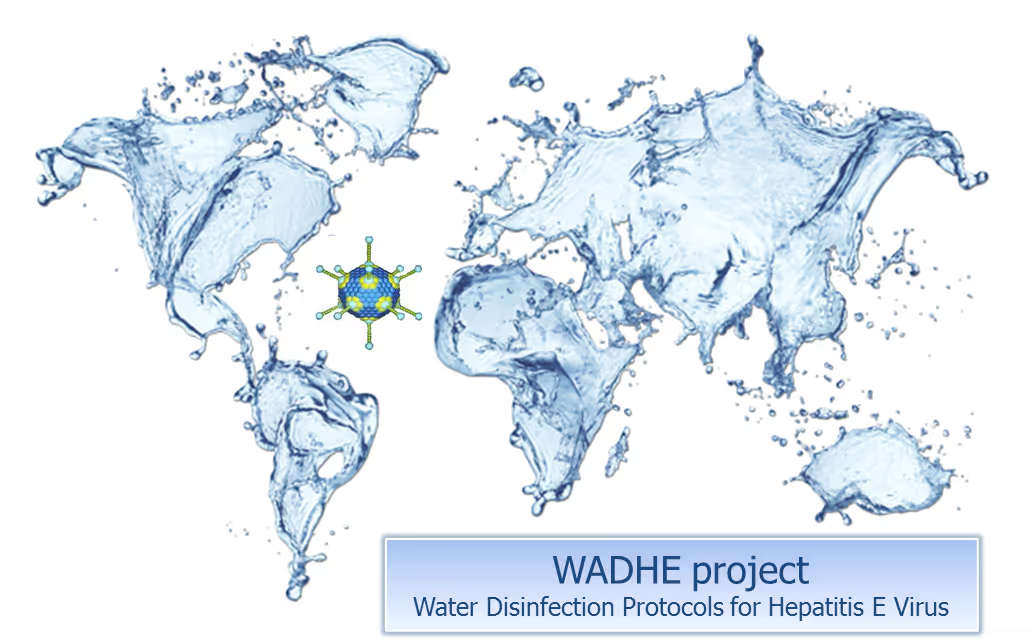Water Disinfection Protocols for Hepatitis E Virus (WADHE)

Project overview
This projects developed an evidence-based Standard Protocol for water disinfection in HEV outbreak settings, giving a better understanding of risk factors and transmission routes (key to prevent, control and limit HEV outbreaks) for use by WASH stakeholders.
Project solution
This project offers [specific solution or intervention] to tackle [challenge]. By implementing [strategies, tools, or innovations], the project aims to achieve [desired outcomes]. The approach is designed to [specific actions or methods] to bring about meaningful change in [community, region, or issue area].
Expected outcomes
This project aims to achieve [specific outcomes], such as [measurable results, improvements, or changes]. The expected impact includes [benefits to the target community, advancements in research or innovation, or long-term effects]. By the end of the project, we anticipate [specific changes or milestones] that will contribute to [broader goals or objectives].
Summary
Hepatitis E is an emerging waterborne virus endemic in regions with poor sanitation and hygiene, including large parts of Asia, Africa and South America. It is responsible for medium- to large-sized waterborne epidemics, causing a large proportion of cases with sporadic acute hepatitis.
Hepatitis E Virus (HEV) was very inefficiently cultured until now and no experimental data has been published on HEV disinfection. Some studies have suggested that drinking chlorinated surface water did not appear to reduce the risk of infection.
However, recently has been described a new HEV strain, that can be now used for developing disinfection and stability studies.
The development of experimental data on HEV stability in water will bring to humanitarian actors specific protocols for interventions on water or food borne HEV epidemics as well as a better understanding of risk factors and routes of HEV infection.
Challenge(s) addressed
• Understand effectivity of water disinfection methods in presence of HEV.
• Improve understanding on HEV epidemiology and transmission routes.
Innovation factor
The innovation proposed in this application consist on producing for the first time consistent experimental assays on HEV stability against main disinfection water treatments, filling this gap in virology and answering an operational need on water services in vulnerable settings with the end up objective of developing Standard Operational Protocols on Water Treatment in Hepatitis E outbreak scenario.
Added value
Effective and feasible water treatments should be identified to prevent human infection on HEV outbreaks (mainly transmitted by oral-faecal route) in emergency interventions.
Innovation phases
It will consist of 4 main phases:
1) Create an experimental system to analyse HEV removal/inactivation.
2) Characterise inactivation profiles for each treatment.
3) Developing Standard Protocol for water disinfection in HEV outbreak settings
4) Identification of sources of contamination and transmission routes in a HEV outbreak
Key deliverables/impact
The target beneficiaries of an evidence-based Standard Protocol for water disinfection in HEV outbreak settings, and a better understanding of risk factors and transmission routes (key to prevent, control and limit HEV outbreaks) are WASH stakeholders, specifically humanitarian International NGOs, local NGOs and Government Health officers related to WASH work in HEV prevalent areas or HEV outbreaks.
Project delivery & updates
Stay up to date with the latest developments from this project. Here, you will find details on what has been delivered, resources created, and regular updates as the project progresses. Access key documents, reports, and other materials to see how the project is making an impact.
Resources
Report
LEARN MORE